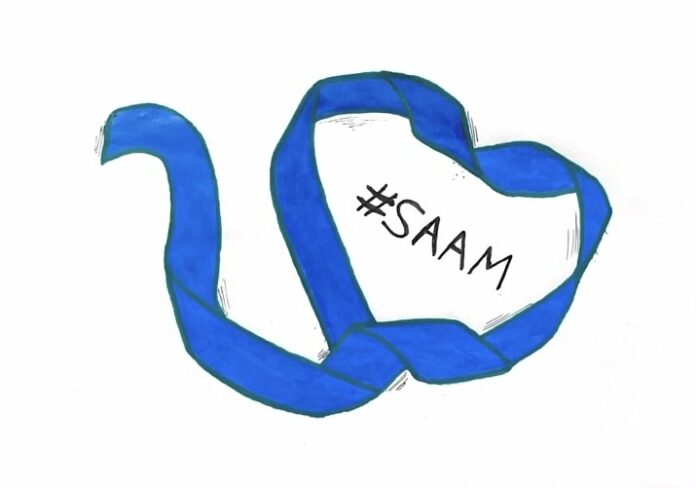April is Sexual Assault Awareness Month. I wrote an article last year at this same time speaking on the importance of this particular awareness month.
But if I’m honest, it wasn’t my best article. I focused mostly on resources and training available to students and faculty on campus and the importance of events that show survivors are supported and have a community. While this isn’t a negative thing, and I hope it found at least one reader who needed the information, I should have done more.
I treated a deeply personal and important issue in a very clinical way because I was still not entirely comfortable with covering the topic of sexual abuse. I barely even alluded to my own history of abuse, making only a brief mention of it before quickly moving on.
I recently went to the Take Back The Night event that is run by the Wellness Center every year. Being in that environment as a survivor of abuse myself was extremely cathartic and it made me realize the importance of hearing the stories of fellow survivors.
I couldn’t muster up the courage to share my story in person at the event. Even the orange beads I was wearing to signify my unfortunate status as a person with a story, I put it around my wrist and hid it under my hoodie, not wanting to be asked about my experiences. I’m not much of a speaker and this is the most difficult thing in my life to talk about, but I want to provide that same catharsis I felt to others.
I am not going to focus heavily on the actual acts of abuse. I want to focus mainly on my experiences of reporting and the emotions that came and came with my story.
I will just say that I was emotionally abused for 10 years and sexually abused for two, by my mother’s first long-term partner after my father’s death. This was a person who I saw as a trusted authority figure in my life, so I was in denial about the sexual abuse for a while, about a year. By the time I came to terms with the fact that it had happened at all, I thought it was too late to do anything, even as abusive incidents continued to happen. I feared I would be doubted by some and my mother, who I knew would believe me, would blame herself.
I was also terrified of the idea of having to talk to police about what happened, or testify in court if things got that far. I just tried to distance myself from this person and forget what happened, but there’s only so much you can do when you live with your abuser.
When my mother found out what happened, she kicked the abuser out and he was missing for three days before he was found. He had taken his own life down the road from my house and was found on my brother’s birthday, but when the police were still looking for him as a missing person who was potentially a risk to himself, I had to go into the police station to give a statement on what he had done in case he was found alive.
I couldn’t sleep or eat properly for days after I finally had to tell my mother what had been going on, and even more so after the abuser was found. The whole thing was completely traumatic for me. From the abuse itself to the reporting, to the abuser being found dead. It was all totally out of my control.
I also had a lot of guilt about the fact that the abuser was found on my brother’s birthday, which made the situation more traumatic for him as well.
In the aftermath, I felt the need to manage my mom’s guilt over the abuse. She was also emotionally abused by this person, but she didn’t know about the sexual abuse that had happened to me.
She had her own experiences of various forms of abuse throughout her childhood, as every woman on my mother’s side of my family has. My mom of course didn’t want that for me and the fact that I had to go through it too almost broke her. Having that added to my own healing was extremely difficult.
My mother got me into therapy almost immediately, where I was officially diagnosed with PTSD. However, I was not able to handle the idea of confronting the abuse in therapy at that point in my life. As a result, I stopped going as soon as I turned 18, so my mom wouldn’t be able to make me go. I haven’t been back since, though I am much more ready now and have been looking for a therapist.
My journey toward healing has been difficult and it is not yet complete. I still have a long way to go. My PTSD is much better, but as much as I’d like it to go away forever on its own, I have come to terms with the fact that in some way or another, this disorder will probably be with me for the rest of my life.
Another major step in moving forward for me was starting to get involved romantically with people. In the aftermath of the assaults and abuse, I never thought I’d be able to date. I assumed I would never feel comfortable with opening up to someone and being vulnerable in the way that healthy relationships require. But in recent years I’ve been able to explore relationships more and am currently with an incredibly sweet and supportive guy.
I am also looking into how to work with others, as an advocate with the Center for Family Services or something similar, who have been through similar situations and to get them the support and resources they need in one of the most difficult times in their lives.
If you haven’t experienced these things, I hope this sheds some light on what survivors go through so you can help to better support those in your life who have been through an experience like this.
To my fellow survivors, victims, and anyone else who has a story, I hope this helped you feel seen and validated in the emotions you’ve felt in the aftermath of reporting your abuse. It’s difficult, especially in the first year after an assault or coming to terms with abuse. But it does get better. Find a support system, and a passion, talk to a therapist if you’re comfortable, and go to events that show you are not alone because you’re not. All of these things go a huge way in moving forward and healing.
For comments/questions about this story DM us on Instagram @thewhitatrowan or email thewhit.opinion@gmail.com






